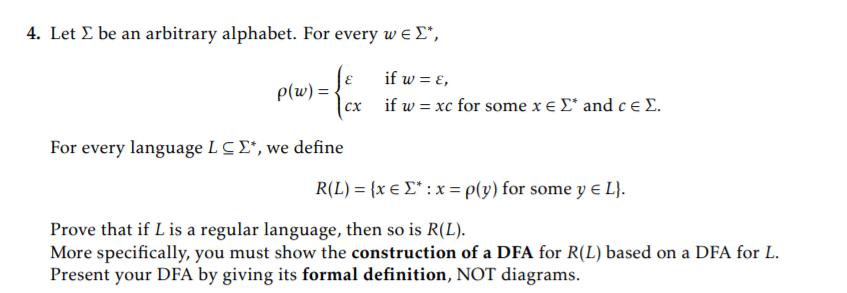Question
4. Let be an arbitrary alphabet. For every w *, if w = E, {x |cx if w = xc for some x *

4. Let be an arbitrary alphabet. For every w *, if w = E, {x |cx if w = xc for some x * and c e . For every language L CE*, we define p(w) =. R(L)= {xe E*: x = p(y) for some y = L}. Prove that if L is a regular language, then so is R(L). More specifically, you must show the construction of a DFA for R(L) based on a DFA for L. Present your DFA by giving its formal definition, NOT diagrams. 4. Let be an arbitrary alphabet. For every w E E*, if w = E, {x |cx if w = xc for some x * and c e . p(w) =. For every language L CE*, we define R(L) = (x e E*: x = p(y) for some y L}. Prove that if L is a regular language, then so is R(L). More specifically, you must show the construction of a DFA for R(L) based on a DFA for L. Present your DFA by giving its formal definition, NOT diagrams.
Step by Step Solution
3.28 Rating (145 Votes )
There are 3 Steps involved in it
Step: 1

Get Instant Access to Expert-Tailored Solutions
See step-by-step solutions with expert insights and AI powered tools for academic success
Step: 2

Step: 3

Ace Your Homework with AI
Get the answers you need in no time with our AI-driven, step-by-step assistance
Get StartedRecommended Textbook for
Introduction to Algorithms
Authors: Thomas H. Cormen, Charles E. Leiserson, Ronald L. Rivest
3rd edition
978-0262033848
Students also viewed these Programming questions
Question
Answered: 1 week ago
Question
Answered: 1 week ago
Question
Answered: 1 week ago
Question
Answered: 1 week ago
Question
Answered: 1 week ago
Question
Answered: 1 week ago
Question
Answered: 1 week ago
Question
Answered: 1 week ago
Question
Answered: 1 week ago
Question
Answered: 1 week ago
Question
Answered: 1 week ago
Question
Answered: 1 week ago
Question
Answered: 1 week ago
Question
Answered: 1 week ago
Question
Answered: 1 week ago
Question
Answered: 1 week ago
Question
Answered: 1 week ago
Question
Answered: 1 week ago
Question
Answered: 1 week ago
Question
Answered: 1 week ago
Question
Answered: 1 week ago
View Answer in SolutionInn App



